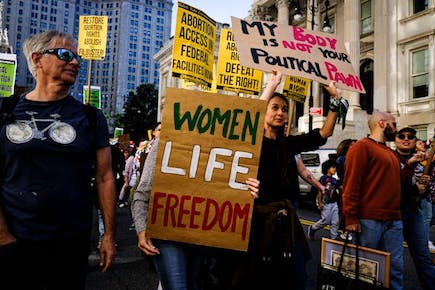
On April 9, Arizona’s state Supreme Court re-imposed an 1864 law banning abortion in almost all cases. As early as June 8, those assisting aiding in an abortion could face felony charges with up to five years in prison. The 160-year-old law, enacted 50 years before Arizona gained statehood, outlaws abortion from the moment of conception. It includes an exception to save the life of the mother.
The Arizona ruling came just two days after former President Donald Trump said states should make their own decisions about regulating abortion — an attempt to justify his central role in the U.S. Supreme Court’s overturning Roe v. Wade, eliminating federal constitutional protection for access to abortion.
One day after the Arizona Supreme Court reinstated the 1864 abortion ban, the state’s Republican legislators blocked multiple attempts by Democrats to repeal the law. But Arizona voters will likely have the final say. Abortion rights advocates have gathered more than 500,000 signatures to put a constitutional amendment on the November ballot that would protect abortion until fetal viability, at around 22 to 24 weeks. Between The Lines’ Scott Harris spoke with Katie Herchenroeder, a fellow at Mother Jones magazine. She discusses how Arizona’s imposition of the 1864 abortion law will impact the lives of people and health care providers in the state, and the national political debate ahead of this November’s presidential election.
KATIE HERCHENROEDER: So, I lived in Arizona between the ages of 9 and 18, and I still have immediate family there. I have friends, childhood friends, I received both texts being, really confused, saying, What does this mean for my friend? What does this mean for me? What does this mean for my family? And then I also just received a lot of anger, a lot of anger on social media from people seeing this reporting that I’ve been doing and anger that this is happening, and also disbelief that something from 160 years ago could apply to their lives today,
SCOTT HARRIS: Katie, this November, it’s expected that enough petition signatures will be collected by pro-choice activists to hold a statewide referendum that could overturn the 1864 abortion ban. What’s the status of that effort now and do you expect that voters will support abortion rights in November?
KATIE HERCHENROEDER: So a little over a week ago a coalition of groups across Arizona announced that they were able to secure enough signatures to include this constitutional amendment on the ballot. It would create a fundamental right to abortion up to the 24th week and it could go beyond that to quote, protect the life or the physical or mental health of the pregnant person. And this is especially important because as compared to other life of the mother exceptions, this also includes mental health, which is just a broader protection. A little bit of context there, similar statewide ballot measures have succeeded with voters in California, Kansas, Kentucky, Michigan, Montana, Ohio, and Vermont. And so we’ve seen across the country in response to the Dobbs decision, that this is a real avenue that voters are using to have their voice heard on abortion access and reproductive justice.
In Arizona, specifically during the 2022 midterms, the majority, 6 out of 10 Arizona voters said that they were in favor of guaranteeing legal abortion nationwide. So it’s tough to know, but in the context of the backlash that I’ve been hearing about this 1864 ruling, people are angry and people are wanting their voices to be heard. So I, at minimum, I expect a close vote on that ballot measure.
SCOTT HARRIS: Katie, what’s your view of the media coverage of this issue across the country? We have Donald Trump trying to muddy the waters and really attempt to convince voters that he’s not responsible for these draconian abortion laws, which he clearly is and took credit for on many occasions. And you also have many state legislators. You have congressional candidates and senate candidates who continually try to walk a fine line and not take a position on their anti-abortion votes that they’ve cast many times in their state or federal legislature. Is the media properly holding these people to account for their schizophrenic rhetoric that they spout as the election approaches?
KATIE HERCHENROEDER: I’d say two things. One, I think that local Arizona media, namely the Arizona mayor and the Arizona Republic have been doing just incredible reporting on holding these members of government to account. They consistently do great reporting on local Republican candidates who have, as we’ve been talking about, switch their tone. And so I think that that’s very, very commendable.
I think that nationallym the media at large can still be wise to keep context to the things that Donald Trump says about abortion. I think that that spreads to headlines and leads. So instead of saying just that Donald Trump says he will not support a national abortion ban or a headline that says, you know, Donald Trump thinks Arizona went too far, I think that it’s our responsibility on the national stage to put those comments in context. My colleague Julianne has done a great job of this as saying, well, Trump says that he is not gonna pass a national abortion ban days after he took credit for ending Roe v Wade. And I think putting those two things in the same sentence is immensely important for readers to know.
Listen to Scott Harris’ in-depth interview with Katie Herchenroeder (28:08). More articles and opinion pieces are found in the Related Links section of this page.
For the best listening experience and to never miss an episode, subscribe to Between The Lines on your favorite podcast app or platform: Apple Podcasts, Spotify, Google Podcasts, Amazon Music, Castro, iHeartRadio, Pocket Casts, Tunein+ Alexa, Castbox, Overcast, Podfriend, RSS Feed.
Or subscribe to our Between The Lines and Counterpoint Weekly Summary.




